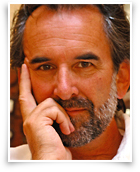
Richard Harvey
connecting psychotherapy and spiritual growth for human awakening
When God Is, I Am Not
A lot of what passes for spiritual practice today is not really spiritual at all. It would hardly need remarking if it were something like the inversion of adjectives, such as bad meaning good, or get down meaning get up (and dance). But behind this devaluing is an insidious process of dilution and annihilation: the latter of grammar, the former of true spirituality. The erosion of grammar is arguably heinous, but the destruction of the spiritual is catastrophic. If we lose sight of the road, we may never reach our destination. Similarly, if we cannot recognize authentic spirituality, we lose the way back to ourselves and are truly lost.
One basic fundamental principle of spirituality is so unpopular today as to be almost completely ignored. It is that human incarnation offers us the opportunity to realize ourselves as spiritual beings. Individual self-interest, self-aggrandizement and self-importance are of interest to materialists and egoists only. A genuine spiritual event takes place in the absence of a sense of individual identity.
Only when you are absent is the numinous present. You can talk with God all you like, communicate via letters (emails?), poems, music and other art forms. But ultimately no communication is possible between two who are one, or another way to put it is that communication exists only between two separate individual entities. God is not an entity; God is more truly yourself than you are! Therefore, you have no need of speaking with God. What you do need is to rid yourself of selfhood, ego, self-contraction, the individual, separative “I”, which is what Buddha called suffering. You do this by losing yourself in God, immersing yourself in God, surrendering to God until all you see is God, because everything is God.
In the Seventies you could buy posters that at first sight appeared to be a lot of squiggly lines on a page. The trick was to defocus and perhaps look a little obliquely at the poster. Something would happen in your brain, sometimes quite perceivable experientially. The lines would realign themselves into fish or people or flowers. Then you realized that forms and formlessness exist together in parallel modes of perception: the way you saw things was simply a way and not the way. The method was defocusing, without that you had only the squiggles.
The method for entry into the spiritual realm is similar to perceiving the poster. In one sense you must defocus…or really focus. Either way, the price of admission to spiritual reality is your self. When you trick the ego, the separate small self that masquerades as you, into loosening its hold on your perception you “fall through” into reality, into eternity, into the truly spiritual and, beyond the squiggles of selfhood and suffering, you see God.
When this truly happens, no one is there. No one is present, there is only Presence. No one has experiences of the spiritual, there is only experience, or it would be closer to say only there is! In a sense all of this is obvious when you think about it. Because the spiritual pursuit—meditation, self-enquiry, mystical movement, reading scriptures for inspiration, intuition, ACIM, zazen, dervish whirling—you are doing is designed to release you from the dualistic world, in which your individual separateness struggles with ultimate reality, resisting, fighting, denying, bargaining, despairing about it all and inevitably retiring for a rest in the narrow, warming, comforting confines of egocentric pleasures.
The pleasures of so-called “spirituality”, are many and varied: relaxation (sometimes very profound), pleasure (likewise), beatific moments of “spiritual” breakthrough and experience, emotionally exalted feelings of oneness with others, love (in whatever human, blissful, but usually separate form) and so on. But none of these are strictly spiritual. Why? Because spiritual means “not material”, “not temporal” or “incorporeal”. The world of the spirit is usually defined in contrast to what it is not. But spirit, while indefinable semantically, is distinguishable from phenomena precisely because it is located in the absence of arising phenomena, temporal and conditional events and beings—and that's the point! Spirituality is of the noumena, of otherness, of God, by whatever name we know God. When God is, I am not.
In God we are met and subsumed not as a separate entity or some missing part. The divine epiphany is a profound and ecstatic homecoming that words can never describe and no concepts can ever explain. Coming home to God is returning to our Self, remembering, re-knowing, intuiting; coming back to Heart is the recognition of our True Self as all and everything, because there is no other in God, no divisible entities, nothing but a sudden leap of understanding that we have always been like this, always been here, always been perfectly safe and at rest, happy and peaceful, wise and blissful.
No experience, no insincere, superficial or misinformed spiritual practice could ever provide this realization of the truth.
Share this article
This article was published in Spiritual Guidance, December 2011, on servingyourjourney.com.